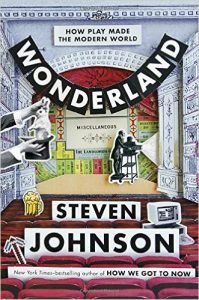This book was a bit light, but still very enjoyable. The thesis is that play and  pleasure very important to the history of science, technology, and culture. As an example, Johnson argues that interest in automata helped lead (if a little indirectly) to the development of computers. Apparently, Babbage was quite interested in these early robots as a child, and it probably influenced his work. Johnson discusses other topics, such as the spice trade and the development of the Jacquard loom.
pleasure very important to the history of science, technology, and culture. As an example, Johnson argues that interest in automata helped lead (if a little indirectly) to the development of computers. Apparently, Babbage was quite interested in these early robots as a child, and it probably influenced his work. Johnson discusses other topics, such as the spice trade and the development of the Jacquard loom.
I found this book fun, though I’m not quite prepared to buy the thesis as such. After all, anything that reaches fruition as a technology must first have been imagined. It’s hard to think of any interesting contraption whose origins couldn’t be traced back to something fun, in part (I suspect) because fun things tend to be easier to make. It’s hard to think of space-rockets coming into existence without someone first making toy versions. Furthermore, people play with all sorts of stuff that, of course, does NOT lead to technological revolutions.
